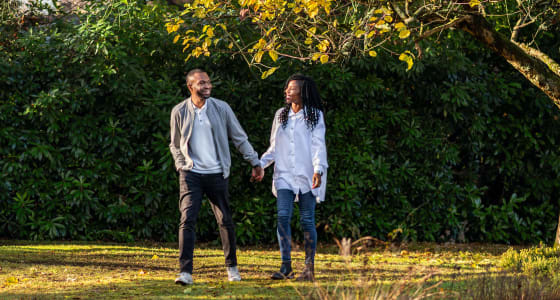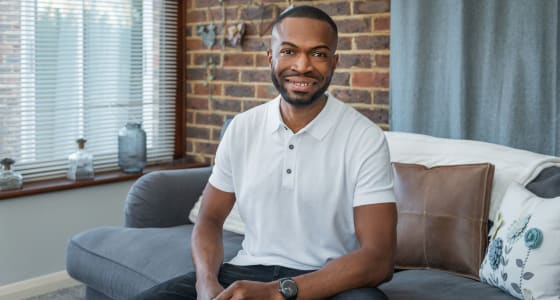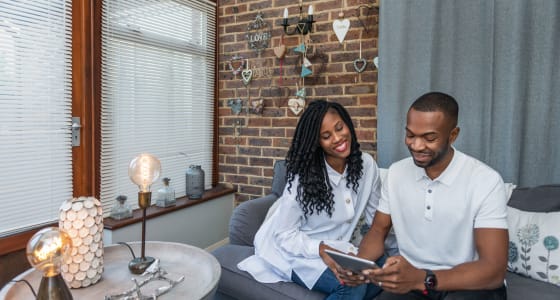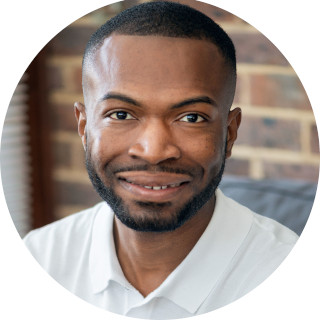
The goal of mortgage freedom and Financial Independence is one that so many people dream of, and wish they could achieve one day. I achieved Financial Independence (including mortgage freedom) in my mid 30s, and today I run a blog and YouTube Channel called The Humble Penny with my wife, to share our journey and with the mission of helping others Create Financial Joy in their lives.
In order to understand the reason why mortgage freedom and Financial Independence was so important to me, I’d like to take you on a journey of seeing life through my eyes. I started the second stage of my life in this country in the Summer of 1998 when my family emigrated to the UK with not very much. I was 14 years old.
20 years later, I became Financially Independent and began what I can only describe as my next life adventure of intentional living and doing family life how I had always desired it. To give you an idea of how things were when I moved to this country, I was on free school meals and thought that was the norm here.
We were relatively poor and, in practical terms, lived beneath the standards of most Brits because we could not claim benefits or use the NHS, as we just didn’t have the rights to do so back then. Life was very difficult but felt hopeful because this country offered so much possibility. Simple things like seeing a bus show up according to a timetable were signs of an organised country where I could thrive one day.
As a young black boy with a strong Nigerian accent, I was often picked on by other boys. So I chose not to say very much most of the time and focused my energy on learning to speak in a way so that I might be understood. I’d watch the BBC and repeat sentences as a way to gradually change my accent. Even then, this presented a challenge for a 14-year-old in East London. This was not how young black boys in that area spoke back then.

Beyond learning to be understood, one other focus as time passed was on my personal education and growth. I took my school work seriously and also took alternative education seriously. This alternative education (via self-help books) eventually led me to read the book called ‘Rich Dad Poor Dad‘.
This book opened my eyes to a different way of thinking about success. It felt like it offered me a blueprint in what would become my initial toolset for the journey ahead. It helped me to imagine a world where I played the game of life differently and created my own possibilities. It changed my mindset around money and helped me to see that money was not the destination, but the vehicle. I needed to use money differently to get somewhere, a stage of the money journey that I now refer to as a stage of Financial Joy.
About a year after reading the book, Rich Dad Poor Dad, I was on a train journey home in London after a break-up with my then girlfriend, and I saw an ad in the free newspaper that I picked up. It was an invitation to a weekend of learning property investing in London Victoria for beginners seeking Financial Freedom. I thought it was a great opportunity, so I took the Friday off work and attended the weekend seminar where my life would change forever.

At this event, I met a beautiful young lady called Mary, who would eventually become my wife. This year makes it 10 years that we’ve been married! Mary too had immigrant roots and at that event as complete strangers, we both wrote on the board our visions for the future. We both wanted to change the game for our families and one day become financially independent. We both wanted to have a family and choose the alternative path to life compared to the path that our parents had followed.
They’d spent many years of their lives working in low-income jobs and when they eventually got on the property ladder in their late 40s and 50s, they spent the rest of their working lives paying a mortgage. This one thing had put so much strain on our families financially. Mary and I wanted to change this for ourselves. It was October 2009 and this became the beginning of our journey together to our own Financial Independence and it was also the beginning of my exploration of some international travel. In January 2011 whilst sitting on a beautiful beach in Zanzibar, Tanzania and planning our wedding, we wrote down our 10-year vision for the future.
That vision included our goal to one day own our own home that we could walk up to and open its door without climbing any stairs. We wanted to become 100% debt-free and mortgage-free, and to actually become financially independent and make working for money optional without having to work until we’re 65. In particular, we hoped to one day be able to explore our passion projects and travel around the world without the restriction of work or money.
We had a strong “why“ for Financial Independence and this goal felt so desirable to us. Thinking about it, this was a crazy ambition to have, particularly as we knew no one else who had done it (apart from the crazy people of the internet). We had no clue how we’d get there but we knew that it was out there waiting for us one day.
Something about that time was special. Dreaming together made this feel like a possibility.
Our approach to Financial Independence
Today, when we teach our approach, we use a memorable acronym (P.O.S.T) to help others remember things:
P - Purpose i.e. Why aim for Financial Independence?
O - Objectives i.e. What is your goal in numbers?
S - Strategy i.e. How will you achieve this goal?
T - Tactics i.e. Which day to day steps will you take?
This P.O.S.T acronym falls under a broader set of tools for the journey:
Skillset
Toolset
Mindset
Ongoing growth and improvements in all three areas are required for the journey and the P.O.S.T acronym falls within the “Toolset”. Things like reading books regularly, getting a coach or mentor, doing specialist courses and hanging around with the right people improve your “mindset” and “skillset” over time.
With our “why“ (i.e. Purpose) for Financial Independence quite clear, next we needed to be clear on the “what“ (i.e. Objectives): clarity on that number we were aiming for and what our version of Financial Independence would look like. This stage is different for everyone because we all have different lifestyles and expectations for the future.
A rough calculation for this is to take your current monthly expenses, multiply it by 12 (for an annual figure) and divide it by 4%.
E.g. If you spend £2,000 per month, then an annual figure would be £24,000 and your estimated Financial Independence pot would be £600,000 (i.e. £24,000 divided by 4%).
The above is just a guide and this number would change depending on the strategy that you take. For example, if you paid off your mortgage early, then the amount you need for the future would be lower as your future expenses would be lower too.
Then there are other elements to factor in such as access to your personal pension and State Pension. Plus the cost of having kids if you plan to have any, your health, and future work issues, which you can prepare for partly via insurance policies.
Now that we were clear on the “why” and the “what”, we needed a “how“ (i.e. Strategy).
We identified five paths to achieving this goal:
Property Investing
Stock market investing (ISA and pensions)
100% debt freedom (including mortgage)
Career maximisation
Creating an online business or side hustle
What we needed to do was choose one path to start with and then tweak as we went along. Our first leap was to get rid of all debts except our mortgage. Then we got into property investing, followed by a combo of stock market investing and mortgage freedom.
Parallel to the above, we focused strongly on our personal development and career maximisation. For example, I went from a trainee accountant in 2006 to qualifying as a Chartered Accountant and worked my way up, through various finance roles, to become a Chief Financial Officer for a London investment business in 2017.
I even managed to bluff my way into getting part sponsorship for an Executive MBA at the Judge Business School, University of Cambridge and managed to graduate in the Summer of 2016 after two years of study, a challenging full-time job and two kids under 3-years-old.
With this rise in my career came significant pay rises and other benefits such as bonuses, pension contributions and equity. My wife was also making leaps in her career and took some time off to have our children before returning back to work. In all this, we also started exploring various side hustles to make money here and there, with all these different economic efforts focused on one ultimate goal: Financial Independence.
It’s worth noting that as we learnt and worked hard over all those years, our lifestyles became simpler over time too. This meant that our savings rate as a family kept rising even with periods where we relied on just my income when Mary was off work for some time to have children. Our Savings Rate (proportion of net income saved and invested) reached around 65% in some months.
This money was invested in three main pots: pension, ISA, and mortgage overpayments. The pension and ISA investments were investments in globally diversified index funds and a selection of tech stocks over the years. One important part to our approach was that Mary and I saw every penny that we made as a family as coming into one pot, and out of that pot we made investments into various areas.
This helped to encourage us to be on the same page about our goals and it also helped us to have fun on the journey and celebrate small milestones by either going on a weekend away or just having dinner out. The having fun part is one that many people leave out of their journey towards Financial Independence. It’s absolutely important to see this as a marathon (with various pitstops for fun) and not a sprint. Especially in a situation where you might be going on this journey with someone else. Don’t be so frugal that you don’t enjoy life too.
Given all the above, we automated a lot of our investing, however, the one element of our strategy that took more willpower than all the others was paying off our mortgage early.
Our journey to becoming mortgage-free
For some context, we bought our semi-detached 1930s home just outside London in 2012 and paid it off in a little over seven years! In all, we paid off about £390,000 (including about £60,000 interest) without a penny of inheritance or anything like that.
Note that this payoff wasn’t done in a straight line. The largest proportion was paid off in the last three years as things gathered momentum. This journey felt like an impossible journey to be honest and the fact that we did it in many ways is a miracle to us but has also proved to us what is possible.
We started off with a 25 year mortgage like most people in 2012, and our main approach here was to overpay our mortgage each month at least once. This is one of the “Tactics” from the P.O.S.T acronym. This overpaying tactic saved us many tens of thousands of pounds in interest payments because overpaying our mortgage meant that the debt was paid off faster and had less time to compound and accrue interest.
One of my most memorable phone calls was remortgaging one afternoon and getting nine years knocked off our mortgage on that one call simply by remortgaging to a lower rate combined with an increased monthly overpayment of around £500 per month. The nine years shaved off the mortgage gave us a huge buzz! We’d literally just bought back nine years of our lives by making one phone call and shifting around our finances. With our mortgage on around 15 years left, the next goal was to get it to 10 years, and then below 10 years.
It helped us a lot that we understood how debt works. Another tactic was that we focused on flexible mortgage deals that allowed us in the latter years to pay beyond the 10% limit without an Early Repayment Charge. With our lifestyles kept at the same level for years, most extra cash (e.g. pay rise, bonus, side hustle) went towards the mortgage overpayment.
Note that we also carried on investing in our pensions and ISAs each year but prioritised our mortgage more in the last three years of those seven years. In short, Mary and I did everything possible to live on just one income at most, and then threw everything else at investments.
It was a very difficult journey to pay off the mortgage and many times we’d ask ourselves, why? We’d remember our 10 year plan and it would keep us motivated. We didn’t share our plans with most of our friends and family because they just didn’t quite understand. Our parents, siblings and a handful of friends knew what we were trying to achieve and that was what mattered.
I will never forget the day we made our last mortgage payment. Mary and I called the bank together and on that sunny afternoon in 2019, we were about to achieve something unimaginable in our 30s. It was incredible to see our mortgage balance drop to that zero balance and we took screenshots to remind ourselves of that moment. We popped a bottle of Rosé and that was the beginning of a new life adventure.
Our monthly expenses immediately dropped massively which meant that all we had to pay each month was our council tax, utilities and food costs. Everything else now goes to our other investments such as investing more into our ISAs and pensions each month, with a larger proportion into our pensions as it offers more from a tax efficiency perspective, particularly as we now run a limited company.
The biggest benefit for us of being mortgage-free today is the mental freedom that it gives us. There’s no morning that we wake up in fear or worry about anything financially now because our cost of living is so low that income from our investments can easily cover it without the need to dip into our savings. And where necessary, we can use income generated from our business too.
2020 was a huge challenge for most people globally due to the pandemic and it affected millions of people financially. Being mortgage-free meant that although 2020 challenged us in so many other ways (such as from a mental health perspective), we were blessed to be able to get by because of the financial decisions that we had made over the last decade. This isn’t something that Mary and I could not have foreseen when we created our 10 year plan.
For this reason and many others, this is why we’re now fully committed to helping others create Financial Joy in their lives too. We want to help people design a life that truly works for them too. Financial Independence is a super power and changes your life, not just in this generation but the generation to come. It creates options and generational wealth.
In addition to the above, it gave me the opportunity to quit my job (and Retire Early from my career) in April 2020 to focus on running The Humble Penny and sister platform Financial Joy Academy full time with Mary from what was just a passion project. Our mission now is to help at least 10,000 families achieve Financial Independence this decade using our various platforms.
It is a tall order but we know that if we achieve even a fraction of what we’re aiming for, the snowball effect of that will be life changing for so many people for generations to come. The adventure continues and we look forward to the opportunity to travel more as a family around the world as things start to open up again.
I hope that my story (so far) has given you the motivation to seek to optimise your life for freedom starting with the money that you make today. The future is made up of so many possibilities and you have the power to choose today which path you want to follow and what type of life you truly want. It’s not too late!
Feel free to reach out to us via our blog, YouTube channel, or say hello on Instagram @thehumblepenny. As ever, in all things, be thankful and seek joy!
Risk warning
As always with investments, your capital is at risk. The value of your investment can go down as well as up, and you may get back less than you invest. This information should not be regarded as financial advice.




